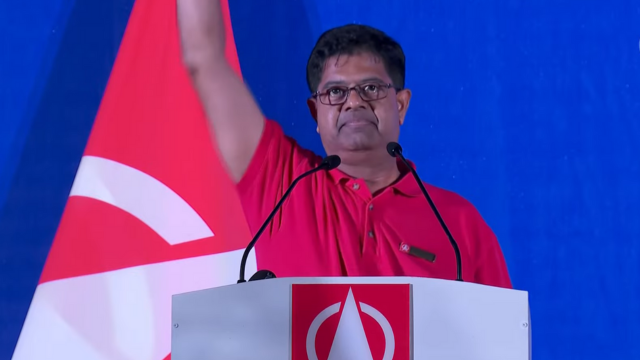
Fellow Singaporeans, residents of Sembawang, dear friends,
Yesterday, the SDP Sembawang GRC team launched the Town Plan for Sembawang, titled: “Putting the ❤︎ in Heartland”.
The Town Plan aims to create inclusive spaces where residents feel supported, connected, and proud to call Sembawang GRC home.
Our plan includes improving accessibility for all, with bike stations, storage units, more outdoor seating for the elderly and lifts on overhead bridges.
We also focus on supporting our youth and local communities through co-working spaces and mindfulness centres.
The plan also encourages better environmental protection, animal welfare and promotes coexistence with nature.
Overall, the Town Plan ideas to improve Sembawang come directly from you – the residents – and it has one simple principle: that a town must be people-centric.
This Town Plan will also shape Town Plans for Sembawang West SMC and Marsiling-Yew GRC.
For better alignment, the SDP will organise regular town halls across all our constituencies in the SDP’s Northern Strategy to collect feedback and improve Sembawang.
This is the summary of the Town Plan presented and released yesterday.
Today, I will speak about a crisis that is becoming central in Singapore: the crisis of elderly care.

Walk around our neighbourhoods in Marsling-Yew Tee, Sembawang West and Sembawang today and you’ll notice some things impossible to ignore.
- More elderly citizens navigating coffeeshops, supermarkets, void decks, walkways and traffic lights
- More mobility vehicles, wheelchairs, walking aids – accompanied by caregivers.
- Many of these caregivers aren’t professionals. They are spouses, sons, daughters, and grandchildren.
Singaporeans are already stretched thin, balancing careers, raising children and now – caring for our seniors. And they are doing it mostly alone, unpaid, while coping with internal family stress.
This is a crisis unfolding in our homes and within the community, and this is all taking place in the face of an unresponsive, under-performing Health Minister Ong Ye Kung, who has held this position for nearly 4 years since May 2021.
Singapore is ageing, and it’s ageing fast.
Today, 1 in 6 citizens is over the age of 65. By 2030, that number will rise to 1 in 4. We are on the cusp of becoming a “super-aged” nation.
Where Ong Ye Kung, as Health Minister, has failed – is putting in place a multi-faceted support mechanism for caregivers.
Behind every elderly person who needs care, there is a caregiver who is under-resourced, exhausted, unsupported and often invisible.
There are over 200,000 caregivers in Singapore – but the real number is likely higher. Most are over 40. Most are women.
Most are part of what’s known as the “sandwiched generation” – adults who are expected to raise their children and support their parents, all the while holding down a job and trying to stay afloat in one of the world’s most expensive cities.
Here in Sembawang GRC, it’s an everyday reality. The adult working age population aged 46-65 (accounting for 30%) takes care of seniors (making up around 11%) and those below 25 (which makes up 30%).
But here’s the thing – the working age group will become older (and we do not know about their future job situation) but will nevertheless be taking care of an even larger pool of seniors in just 5 years.
Caregiving is financially draining.
Informal caregiving for seniors in Singapore is valued at over 1 billion annually, and primary caregivers provide work equal to nearly $16,000 per year in unpaid labour.
Families can spend up to thousands every month on home care, equipment and medicine. The average cost of caring for a severely disabled senior is as much as $3,100 per month.
Less severe cases range between $900 and $2,100.
As more seniors live with chronic conditions like dementia, cancer, or heart disease that require long-term and costly care, the financial strain is set to grow further.
And starting April 2025, Ong Ye Kung’s Health Ministry have raised MediShield Life premiums by up to 35% over the next three years. On average, each insurance holder will pay 22% more.
Changes to MediShield Life also include a significant increase in the inpatient deductible, which will rise by up to S$1,500.
These policy decisions made by Ong Ye Kung lack crucial public accountability and transparency. It is still not clear how these hikes are calculated, but in the meantime, this is adding to Singaporeans’ hardships.
Who does this impact the most? Our seniors. Some of them are on fixed incomes, while many others have no income at all, with little to no CPF payouts.
The subsidies provided are not enough to cover the high costs of healthcare, and this leaves many seniors struggling to afford increased medical expenses – especially for complex and chronic conditions.
In the end, some chose not to seek medical help at all, fearing the costs.
Meanwhile, young Singaporeans worry that premiums will keep rising over time without major reforms, making the system less sustainable for them in the future when they will rely on it.
Is there a Home Caregiving Grant? Yes, but how much is it?
Just $400 – and that’s if you manage to qualify. If your household’s income crosses $3,600 per person or the annual value of your home is worth more than $12,000, you’re told you are not eligible for the support. You’re on your own.
The cost is not just in dollars.
In some cases, family members are left with no option but to leave the workforce entirely, coming at a great cost to long-term career progression and security.
And the emotional toll is staggering.
Nearly half of Singapore’s caregivers are at risk of depression and burnout; with many others expressing suicidal intentions.
Think about that. The people we rely on to hold our families together – are falling apart.
So, where has Ong Ye Kung been in all this?
Ong voted twice to raise the GST. But caregivers still struggle to afford basic home care, medical expenses and specialised equipment for their elderly loved ones.
Meanwhile, we do not know from Ong Ye Kung’s Health Ministry where the money actually goes: no detailed accounts, no transparency, no real support reaching the families who need it most.
And there’s no clear long-term plan from Ong Ye Kung to keep medicine and treatment affordable.
While families are left scrambling to cover the soaring costs of caregiving, the system stays broken – while Ong Ye Kung, and this is becoming a pattern, stays silent.
Worse, the government wants to outsource responsibility – telling individuals to eat better, walk more, “Age Well” – while dodging their own duty to provide care infrastructure that actually works.
The slogans are distractions.
Slogans like “Age Well” ignore the reality that many illnesses, like dementia, cancer, and heart disease – are genetic, complex and demand serious long-term support, not slogan blame-shifting the responsibilities to the elderly.
So yesterday, when Lawrence Wong said it’s not a time to take risks – I agree.
It’s not a time to take the risk of giving the “Aljunied-abandoning, Sembawang parachuting”, “hope a so-called three-corner-fight will save me” Ong Ye Kung another term.
It is tantamount to giving PAP a blank cheque and allowing them to push up caregiving costs, and leaving families to fend for themselves.
It doesn’t have to be this way.
The Singapore Democratic Party has a different vision. A vision rooted in dignity, justice, and compassion.
We believe caregiving must be treated as a national priority – not a private problem.
One, we will expand community-based eldercare by setting up nursing care centres, staffed by nurse practitioners and part-time physiotherapists, to provide regular home care, advice and basic medical services, under doctor supervision.
Two, we propose increasing the number of salaried positions for health workers providing home caregiving with their funding coming directly from the MOH budget, ensuring stable and fair compensation.
Three, for informal caregiving, we will fight for comprehensive paid family leave – so caregivers no longer have to choose between their jobs and their loved ones.
No one should be forced to quit their career to do what the government should be helping them do.
Four, we will push for workplace flexibility across all sectors. Whether it’s remote work, part-time roles, or staggered hours, caregivers deserve the chance to remain economically active while caring for their families.
Five, we will fix the subsidy system – removing unrealistic income caps and aggressive means-testing, and increasing the support to reflect real costs. No more token grants that barely scratch the surface.
Six, we will push for inclusive eldercare policies – embedding elder support into housing, transport and community planning. Ageing should not mean isolation or indignity.
And caregivers should not be left to fill the gaps of the PAP’s broken system.
Seven, and lastly, we will promote active ageing – not just as an ideal, but as a practical policy. Outdoor activities, senior employment and peer support networks. They are essential parts of reducing the long-term strain on caregivers and public health.
We believe that the true measure of a country is how it treats those who cannot care for themselves – and those who carry the responsibility to care for them.
Ong Ye Kung has had years to fix this, but instead we got slogans, higher costs, and families left to shoulder the burden alone.
Ong Ye Kung is not worthy of another term.
This general election is about building a Singapore where caregiving is supported, where our elderly live with dignity, and where every caregiver knows that their work is recognised and never forgotten.
We need MPs who listen, who care, and who are accountable to the residents they serve. That’s the SDP’s promise.
So, Sembawang voters – Vote SDP. Vote for SDP MPs.
Give us a clear mandate.
Thank you.